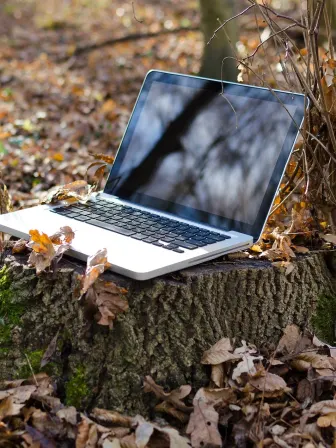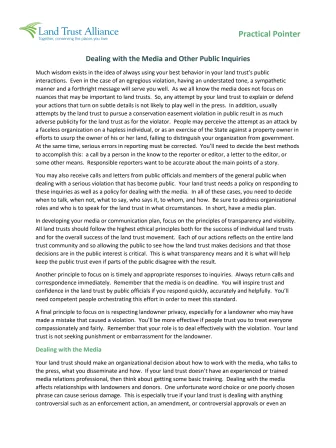Media outreach for advocacy
Source

About This Document
When you’re working to change policy outcomes, media stories can make your message more powerful. Stories in newspapers, TV, radio, blogs and other types of earned media help you reach people outside your own network, engaging them with upcoming policy decisions. And when constituents start paying attention, elected leaders pay attention too.
Advocacy campaigns also create opportunities for media coverage that raises your profile in your community and leads to new connections. Here are some tips for getting good media coverage of your advocacy work.
© 2014–2022 Land Trust Alliance, Inc. All rights reserved.
Build relationships
Like so much of land trust work, media outreach is all about relationships. Get to know the journalists most likely to cover your issues and make sure they know what your land trust is working on. You can introduce yourself by setting up a meeting for coffee or conversation — even when you don’t have an urgent issue to communicate.
To connect with journalists, follow their work. Read, watch or listen to their stories, and interact. For example, you can circulate a worthwhile story on your social media, make comments on an online article or send an email thanking reporters for their coverage. If your land trust is on social media, be sure to follow journalists, retweet them on Twitter when it makes sense and post social content that can serve as news leads.
When you know what journalists are working on, you can send them relevant information — so you don’t get lost in their inbox. For priority journalists, make a short personal pitch for a story, instead of just including them on a press release.
Shape the story
There’s always more news out there than reporters can cover. With so much competition, how do you get a story in the media that will get people’s attention and influence decision-makers?
All politics is local — so tell a local story. Most people don’t care about conservation policy in the abstract. But they do care how the policy will impact their community. Same goes for journalists. They’re more likely to pick up a story if you give it a local angle. You could give local examples, provide facts specific to your area, set up interviews with local people or hold a press event involving community leaders. Ultimately, elected officials focus on how policies impact their constituents — so local stories work best to get their attention.
Make yourself useful. How can you help the reporter tell a great story? When you help set up interviews or provide resources like fact sheets, photos and maps, it leads to a better story and a stronger relationship with the reporter. The media may also draw from your website and social media — including direct quotes — so post with this in mind.
Use your own voice. Supplement news stories by contributing content like guest columns or letters to the editor. That way, you get your issue in the public eye and you get to craft the message. Letters to the editor can be a particularly meaningful way to say thank you to an elected official who supports your cause, giving him or her credit in a public forum.
Be the circulation department. Once a story is published, there’s a lot you can do to get it seen — like sharing it on social media, posting it to your website or linking to it from an email newsletter. Many Americans now get their news, in part, through social media — and journalists appreciate the extra exposure. You can call elected officials’ attention to the story by sending them the article, along with a note.
Explore related resources
- Alliance members: $70.00
- Non-members: $100.00

Social media for advocacy
Channels like Facebook, Twitter and Instagram definitely offer unique potential to engage more people with policy. Social media also offers more channels for communicating with our elected officials. Here are some ideas and tips to explore when utilizing social media for advocacy.

Finding value in 'fluff'
This blog argues that we shouldn't discount the power of "fluff" to reach new audiences, raise the profile of your organization and inspire readers to learn more about your work. It includes tips for how to share your stories with media outlets.

2024 Land Trust Alliance Advocacy Days
Join us for Land Trust Alliance Advocacy Days! We invite the staff, board members and volunteers of Alliance member land trusts to participate in our annual advocacy event to make a significant difference in land conservation.
18 Ways to Pitch the Right Media Outlets to Reach Polarized Audiences
PR professionals today need innovative strategies to successfully reach target demographics in a fractured media landscape. In this article, members of the Forbes Communications Council share strategies on getting stories into the media spotlight so that they resonate with the right people.

Shouting into the Void: Communicating Post-Social Media
Join the team at Bold Bison for a thought-provoking webinar where we’ll explore what’s changing on social media, evaluate strategies to lighten the load of account management and consider new ideas to rebuild community with our audiences in a (post?) social media world.

Dealing with the Media and Other Public Inquiries
This document presents principles to focus on and basic tips when dealing with media representatives and other public inquiries.
Commonly Purchased Insurance
There is no set formula for the amount of insurance coverage for a land trust or an actuarial table for appropriate limits of liability and deductibles. Land trusts frequently purchase coverage through multiple types of insurance. These practical pointers describe how the various insurance coverages can fit together to provide comprehensive coverage for your land trust.

Wildlife Connectivity: Opportunities for Legislation
This interactive policy brief from the Center for Large Landscape Conservation highlights advocacy opportunities for the conservation community to increase connectivity at a landscape scale.